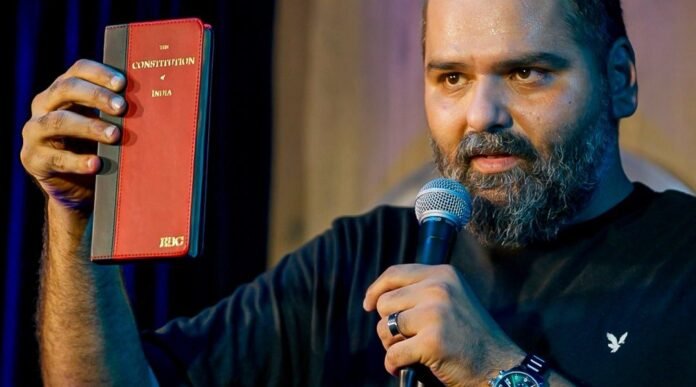The Bombay High Court has granted him interim protection from arrest after an FIR was registered against him for allegedly calling Maharashtra Deputy Chief Minister Eknath Shinde a ‘traitor’ during a comedy performance. The move comes just as a temporary safeguard granted earlier by the Madras High Court was due to expire.
Origin of the Controversy
The case stems from a performance Kamra delivered in January 2025 at a comedy venue in Khar, Mumbai. In his trademark satirical style, Kamra referred to Eknath Shinde as a “gaddar” or traitor—a clear reference to Shinde’s role in the 2022 political upheaval that brought down the Maha Vikas Aghadi government and established a new alliance with the BJP in Maharashtra.
The performance was later uploaded to YouTube in March 2025, drawing sharp criticism from supporters of Shinde. The backlash culminated in an FIR being filed against Kamra based on a complaint by Shiv Sena MLA Murji Patel. The comedian was booked under multiple sections of the Bharatiya Nyaya Sanhita, including those dealing with public mischief and defamation.
Legal Trajectory
Fearing arrest, Kamra initially moved the Madras High Court, seeking transit anticipatory bail on the grounds that he resides in Villupuram, Tamil Nadu. The Madras High Court granted him temporary protection from arrest, which was extended until April 17 to allow him time to approach the Bombay High Court for regular relief.
Following the expiry of this period, Kamra approached the Bombay High Court seeking to have the FIR quashed. The matter was heard at length by a division bench comprising Justices Sarang Kotwal and Shriram Modak. The judges reserved their final order on the plea but provided interim protection to Kamra, directing that no coercive action, including arrest, should be taken against him until the verdict is delivered.
The court also took note of the fact that the summons issued to Kamra were under a section of the Bharatiya Nyaya Sanhita which pertains to notices for recording statements and does not make arrest mandatory. This was interpreted as an indication that the matter did not, at least at the initial stage, necessitate custodial interrogation.
Implications for Free Speech and Satire
The FIR and subsequent legal developments have sparked a wider debate on freedom of speech and the role of satire in a democratic society. Critics of the FIR argue that Kamra’s statement falls squarely within the domain of artistic and political expression, a space protected under Article 19(1)(a) of the Indian Constitution.
On the other hand, supporters of the complaint have pointed out that public figures, including politicians, should not be subject to derogatory language under the guise of comedy. They argue that remarks made in public forums, especially those amplified on social media, have the potential to incite unrest or deepen political divides.
The Road Ahead
With the Bombay High Court’s decision pending, the case could set a significant precedent for how India’s legal system balances satire, political commentary, and defamation laws. For Kamra, who has previously faced contempt of court proceedings and multiple FIRs for his content, the ruling will be crucial in defining the legal boundaries of his profession.
The case also places the spotlight back on the increasingly fraught relationship between entertainers and the state, particularly in the context of political satire. As legal interpretations evolve, all eyes will be on the court’s final verdict and its broader implications for artistic freedom in India.
Until then, Kamra enjoys temporary relief, but the debate over what constitutes acceptable satire in a politically charged climate is far from over.

